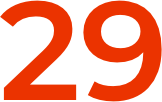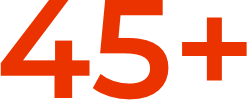Medical Science Liaisons, Nurses & Reimbursement Specialists, Managed Markets
We are a leading provider of outsourced clinical field team solutions
Customers can’t always rely only on their sales teams to overcome hurdles and achieve success with the products they plan to introduce. That’s where we can help. We are industry leaders in meeting customer needs for valuable and credible scientific education for the healthcare professionals (HCPs) who prescribe drugs, and for the patients they will impact.

MSL and CUSMD
teams deployed
between 2013
and mid-2019

Nurse teams
created over
recent 7-year
period
To differentiate a product in a crowded healthcare marketplace, pharma companies need to provide physicians, and the thought leaders they listen to, with a cogent, scientific, evidence-based rationale to prescribe it. Alongside this, they also need to overcome the seemingly inherent resistance of a significant percentage of patients to adhere to (or even begin) therapy, by offering patients ongoing, humanistic, personal training on the value of sticking with prescribed treatments. With our selling solutions, we are a leading provider of outsourced Clinical Field Team solutions to the biopharmaceutical industry. As Medical Science Liaisons (MSLs), Contract US Medical Directors (CUSMDs), and/or Clinical Nurse Educators, our Clinical Field Teams deliver education, preparing health care professionals, patients, advocacy organizations, and others with the latest evidence-based scientific and practical information about disease states, current treatments and the use of customers’ products.
A Medical Science Liaison (MSL) is often deployed well in advance of a product launch in order to inform and to gauge the medical community’s receptivity to a potential new product. The role of the MSL has evolved over time, from tactician to strategist, and from a traditional medical affairs specialist to clinical field research educator and knowledge director. Overall, MSLs provide in-depth, evidence-based scientific information to key opinion leaders (KOLs), communicate the science underlying a customer’s products (usually in the pre-launch period), and usually have a PhD, PharmD or MD, or are sometimes a nurse practitioner or registered nurse with a master’s degree within a specific disease state or therapeutic category.

Our Clinical Field Teams also deploy:
- Clinical Trial Liaisons (CTLs) – to support clinical studies and work on the evolving product label well before launch
- Community Medical Liaisons (CMLs) – to educate HCPs, patients and caregivers with a support focus on advocacy groups
- Public Health Liaisons (PHLs) – these are like CMLs, but with a public health professional and programming focus
- Health Outcomes Liaisons (HOLs) – pharmacoeconomic experts equipped to communicate how a drug’s outcomes are likely to affect payers’ budgets
Contract US Medical Directors (CUSMDs) are board-certified, practicing physicians converted into industry medical directors who work with customers who may be entering a new therapeutic area or who lack sufficient infrastructure to directly hire medical directors themselves. CUSMDs communicate the science underlying a customer’s product and product-related clinical trials to product teams and thought leaders, working closely with commercial and clinical development teams in designing and implementing launch strategies and tactics, as well as product life cycle planning, and product opportunity and threat assessment. They also help coach and provide clinical solutions medical training for the sales force and MSL team.
Our Clinical Educator (CE) Teams are outsourced clinical professionals. They could be registered nurses (RNs) or other clinicians (such as dieticians, respiratory therapists, physician assistants, etc.), whose experience, training and credentials enable them to provide credible education on products and disease states to physicians, HCP office staff, patients and their caregivers. Their efforts typically have the long-range goal of advancing good adherence to appropriate therapies.
With their understanding of the mind of the provider and patient from previous clinical experience, Clinical Educators can help HCPs identify appropriate patients for therapy and effectively communicate field research or clinical evidence-based information, educate office staff on disease state and products, so they are able to identify patients earlier, and supplement or reinforce education already provided to patients and caregivers by providers. Nurses are often able to devote more time and information than providers.
- As patients are tasked more and more to take ownership of their chronic disease outcomes, many products, such as injectables, are self-administered. The Nurse Educator is a resource who can support the patient from prescription to administration, even in the privacy of the patient’s own home. In fact, virtually all of patients in our experience prefer in-home training, which can lead to better patient adherence. As part of pharma companies’ patient support services programs, clinical educators provide education to patients about disease state or products and medical device education and administration training, so the patient is more comfortable and confident with therapy. CEs are often part of live, e-mailed or telephonic patient “check-ins” or reminders about therapy, in an effort to promote compliance, and are well positioned to understand patient barriers to starting or continuing with treatments. They serve as a liaison or speaker for advocacy groups, helping patients receive broader community-based awareness of disease states or treatment options.
- Clinical Educators bridge the gap between physicians and patients. They provide powerful pull-through with disease state education to the patient, while offering updates to physicians on available technology to enhance the HCP’s ability to track patients’ adherence.
- Clinical Nurse Educators provide real, direct benefits to our customers, too, by assisting with clinical solutions medical training of sales teams and providing input for marketing on HCP or patient educational materials, and serving as the “voice” of the customer, with their ability to gain provider insights, competitive information, and patients’ preferences and challenges when it comes to adhering to prescribed therapy. CEs also help build brand “champions” thanks to their peer-to-peer relationships, leverage professional relationships and credentials to assist with access in HCP offices, function as “case managers” in many instances for a seamless patient experience and to enhance access, product administration and compliance or adherence, and also work with sales team counterparts on account ownership, customer relationships and HCP office strategy.
- Our Clinical Nurse Educators have an average of 20 years clinical experience and most have biopharmaceutical experience. CE teams are supported by state-of-the-art technology with salesforce.com and software scheduling via Schedule 360, so customer assignments are filled quickly and geographically matched to defray travel costs. Our exceptional processes for vendor credentialing allows us to get a nurse deployed in one day to meet the needs of hospital customers.
- Full-Time Dedicated CNEs: Provide full-time coverage for a specific territory, working closely with sales reps and HCP offices. Recruited to match the needs of customer stakeholders and ideal for geographic areas of high-volume or where relationships are key to brand loyalty.
- On-Call Specialists (OCSs): Provide clinical solutions medical training and educational services – live or telephonically – on a scalable, on-demand basis to patients, practices, hospitals, clinics, managed care organizations and long-term care facilities, with a 98% response rate within 48 hours.
- Flex/Part-Time CNEs: Nurses who work closely with sales reps and HCP offices on a guaranteed, part-time but flexible schedule. Like OCSs, ideal for low-volume geographic areas or travel needs.
- Patient Service Liaisons (PSLs): Provide comprehensive case management support for patients being treated with a customer product to ensure timely onboarding to therapy and ongoing patient-response assessment.
- Nurse Navigators (NNs): Serve as the main point of regular contact for patients prescribed a particular product of the customer’s (perhaps an injectable or infused product), with responsibilities of case management, delivering resources and education to both patients and HCPs.
We have Clinical Educator teams that work part-time telephonically and part-time in the field, as well as teams that are full-time RNs who work in conjunction with OCS nurses. Through this continuum of offerings, we are able to fully adapt to customer needs.
Wir sind ein führender Anbieter von Outsourcing-Lösungen für den medizinisch-wissenschaftlichen Außendienst.
Kunden können Sie sich nicht immer nur auf ihren Vertriebsaußendienst verlassen, um Hürden zu überwinden. Hier können wir helfen. Wir sind Branchenführer bei der Erfüllung der Kundenbedürfnisse nach gehaltvoller und fundierter wissenschaftlicher Information für Verordnerinnen und Verordner, Meinungsbildner und professionelle Netzwerke.

MSL - Teams
seit 2013

Nurse-Educator-Teams
seit 2016
Um ein Produkt auf einem kompetitiven Gesundheitsmarkt hervorstechen zu lassen, müssen Pharmaunternehmen ihr Ohr am Markt haben, um eine überzeugende, wissenschaftliche und evidenzbasierte Begründung für die Verschreibung ihrer Medikamente zu liefern. Auch scheinbar inhärenter Widerstand auf der Patientenseite, sollte in diese Überlegungen miteinbezogen werden. Fragen der Patienten-Compliance können den Therapieerfolg nachhaltig beeeinflussen. Insofern sind Schulungs- und Aufklärungsmaßnahmen wichtig.
Mit unseren Vertriebslösungen sind wir ein führender Anbieter von Clinical Field Team-Lösungen. Als Medical Science Liaisons (MSLs) und/oder Clinical Nurse Educators bieten unsere Clinical Field Teams Schulungen an und vermitteln medizinischem Fachpersonal, Patientinnen und Patienten, Interessenvertretungen evidenzbasierte, wissenschaftliche Erkenntnisse sowie praktische Informationen zu Therapieverläufen, aktuellen Behandlungen und der Anwendung von Medikamenten.
Ein MSL wird häufig lange vor einer Produkteinführung eingesetzt, um Fachkreise zu informieren und so eine Aufgeschlossenheit gegenüber neuen Produkten zu eruieren bzw. zu steuern. Die Rolle des MSL hat sich im Laufe der Zeit weiterentwickelt: vom Taktiker zum Strategen und vom traditionellen Spezialisten für medizinische Angelegenheiten zum Dozenten für klinische Feldforschung und Kompetenzträger. Insgesamt stellen MSLs KOLs detaillierte, Informationen zur Verfügung, kommunizieren die den Produkten zugrunde liegende Daten und Erkenntnisse (normalerweise in der Zeit vor der Markteinführung).

Unsere klinischen Feldteams sind darüber hinaus auch tätig als:
- Clinical Trial Liaisons (CTLs) – zur Unterstützung klinischer Studien vor und nach Produktlaunch
- Community Medical Liaisons (CMLs) – zur Schulung von Patientinnen und Patienten sowie und Pflegekräften
- Public Health Liaisons (PHLs) – diese ähneln CMLs, konzentrieren sich jedoch auf Fachkräfte des öffentlichen Gesundheitswesens und Kostenträger
- Health Outcomes Liaisons (HOLs) –Expertinnen und Experten, die gesundheitsökonomische Auswirkungen eines Medikaments analysieren und kommunizieren.
Unsere Clinical Educator (CE)-Teams sind klinische Fachkräfte – in der Regel examinierte Pflegekräfte oder andere Spezialistinnen und Spezialisten (z. B. Ernährungsberater, Atemtherapeuten, Medizinische Fachangestellte usw.). Die Erfahrung, Ausbildung und Qualifikationen unseres geschulten Personals ermöglichen es medizinisches Fachpersonal mit hoher Glaubwürdigkeit und konkreten Praxisbeispielen Präparate zu erklären und Compliance-Hürden abzubauen.
Unsere Clinical Educator helfen bei der Identifikation von Patienten und sorgen für die korrekte Kommunikation klinisch-evidenzbasierter Informationen. Damit sind sie in der Lage, Patientinnen und Patienten früh zu identifizieren und ergänzende Daten zur Verfügung zu stellen.
Gerade bei chronischen Erkrankungen steigt die Patientenverantwortung für den therapeutischen Erfolg deutlich, etwa bei selbst applizierten Injektionen. Die Rolle eines Nurse Educator liegt in der Unterstützung der Anwenderinnen und Anwender. Tatsächlich bevorzugen unserer Erfahrung nach praktisch alle Patientinnen und Patienten das Training zu Hause, was zu einer höheren Therapietreue führen kann. Im Rahmen der Patientenunterstützungsprogramme schulen unsere Mitarbeiterinnen und Mitarbeiter die Anwender, klären über die Therapie und die jeweiligen Präparate auf und demonstrieren die Verwendung u.U. notwendiger Medizinprodukte (z.B. Applikatoren)
- Clinical Educator werden häufig als Teil von Live-, E-Mail- oder Telefon-„Check-ins“ oder zur Erinnerung an die Therapie eingesetzt, um die Compliance zu steigern sowie mögliche Anwendungshürden zu senken. Sie fungieren als Bindeglied und helfen Patienten ein breiteres Bewusstsein für Krankheitszustände oder Behandlungsmöglichkeiten zu schaffen.
- Clinical Educator schließen die Lücke zwischen Therapie und Anwenderinnen und Anwendern. Sie bieten wirkungsvolle Aufklärung und informieren medizinisches Fachpersonal gleichzeitig über die verfügbare Technologie.
- Clinical Nurse Educator bieten auch Ihnen echte, direkte Vorteile, indem sie bei der medizinischen Schulung von Vertriebsteams unterstützen, Input für das Marketing oder die Entwicklung von Patientenaufklärungsmaterialien liefern und mit ihren Fähigkeiten als „Stimme“ der Patientinnen und Patienten sowie des involvierten medizinischen Fachpersonals fungieren. Darüber hinaus können sie wertvolle Einblicke in das Marktgeschehen geben sowie Präferenzen und Herausforderungen der Therapiegruppe bei der Einhaltung der verschriebenen Präparate benennen.
- Clinical Nurse Educator tragen dank ihrer Peer-to-Peer-Beziehungen auch dazu bei, Marken-„Champions“ aufzubauen, nutzen professionelle Beziehungen und Referenzen, um den Zugang in Praxen zu unterstützen, fungieren in vielen Fällen als „Fallmanager“ für eine nahtlose Patientenerfahrung und verbessern den Zugang. Sie kümmern sich um Produktverwaltung und Compliance bzw. Adhärenz und arbeiten außerdem mit dem Vertriebsteam an, Kundenbeziehungen.
- Unsere CEs verfügen über klinische Erfahrung und die meisten auch über pharmazeutisches Wissen. CE-Teams werden durch modernste Technologie mit salesforce.com und Softwareplanung unterstützt, sodass Kundenaufträge schnell erledigt und geografisch abgestimmt werden.
- Vollzeit-CNEs: Bieten eine umfassende Betreuung für ein bestimmtes Gebiet und arbeiten eng mit Vertriebsmitarbeitern und Praxen zusammen. Rekrutiert, um den Bedürfnissen der Kundeninteressengruppen gerecht zu werden und ideal für Gebiete mit hohem Volumen bzw. dort, wo Beziehungen für die Compliance von entscheidender Bedeutung sind.
- On-Call-Spezialisten (OCSs): Bieten Schulungen und Aufklärungsleistungen– persönlich oder telefonisch – auf skalierbarer On-Demand-Basis für Patientinnen und Patienten, Praxen, Kliniken und Langzeitpflegeeinrichtungen-
- Flex-/Teilzeit-Clinical Nurse Educator: Pflegekräfte, die nach einem garantierten, aber flexiblen Teilzeitplan eng mit Vertrieb und Praxen zusammenarbeiten.
- Patient Service Liaisons (PSLs): Bieten umfassende Fallmanagementunterstützung für Patientinnen und Patienten, um eine rechtzeitige Eingliederung in die Therapie und eine laufende Beurteilung des Therapieverlaufs sicherzustellen.
- Nurse Navigators (NNs): Dienen als Hauptkontaktstelle für Patientinnen und Patienten und sind für das Fallmanagement, die Bereitstellung von Ressourcen und Aufklärung sowohl für Patienten als auch für medizinische Fachkräfte verantwortlich.
Wir verfügen über Teams von Clinical Educator, die in Teilzeit telefonisch und in Teilzeit vor Ort arbeiten, sowie über Teams von Krankenschwestern in Vollzeit. Durch dieses Kontinuum an Angeboten sind wir in der Lage, uns vollständig an die Bedürfnisse unserer Kunden anzupassen.





